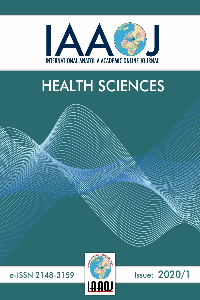
International Anatolia Academic Online Journal Health Sciences
Yazarlar: Muhammet Mesut Nezir ENGİN, Önder KILIÇASLAN, Merve ASLANTAŞ, Kenan KOCABAY
Konular:Sağlık Bilimleri ve Hizmetleri
Anahtar Kelimeler:Breast Milk,Vitamin D,Knowledge level
Özet: Breast milk is a vital food for babies' healthy growth, evelopment and balanced nutrition. According to the data obtained from the studies, breastfeeding is common in our country. However, although it is widespread, the lack of positive effects of breastfeeding on the health of children suggests that families make misapplication when feeding their babies with breast milk. For this reason, it is aimed to determine the errors, correct the errors and shape the trainings given to the mothers by evaluating the nutritional knowledge levels of colostrum and breast milk of mothers with 0-3 months babies. In this cross-sectional study, mothers who were admitted to the Neonatal Polyclinic of Düzce University Hospital between January 2018 and April 2018 were planned to take. Ethics committee approval was received for this study. Demographic information, obstetric history of the mothers and questions about the time of onset of breastfeeding were recorded. The study was conducted with the participation of 924 mothers who applied to the neonatal outpatient clinic for various reasons, who had a baby between 0-3 months and were willing to participate in the study. According to the ages of the mothers included in the study, 9.5% were under 20 years old, 31% were between 20-24 years old, 23.8% were between 25-29 years old, 19% were between 30-34 years old and 16% were 35 years of age and over. The was 98% of the mothers breastfed their babies, 53% stated that only breast milk, and 45% stated that they gave breast milk and formula. The 14.2% of the study group stated that there was no information source about breast milk, and 52’4% stated that they were not informed by health workers. Only 21.4% of the baby's breastfeeding period left unanswered and only 57.1% responded that 6 months should be given. The 54% did not answer the question of vitamin D duration of use. The majority of the mothers were breastfeeding their babies, but infants who received only breast milk were not at the desired level. It was observed that the awareness of using breast milk for 6 months alone and giving vitamin D for one year has not reached the expected level yet. Considering that the majority of mothers do not receive information from the health care provider, it should be planned of by family physicians to that the awareness of using breast milk for 6 months alone and giving vitamin D for one year told to mothers.